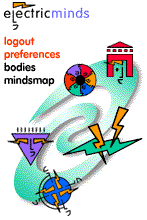
|

|

What is the Web? Ask a dozen people what the Web is. Go ahead. I'll wait. The chances are good when you ask this question that you'll get an awful lot of different ideas, with lots of big words. The Web is an electronic publishing system. The Web is a mechanism for the distribution of interactive multimedia. The Web is a global information system. The Web is a virtual community. Probably the easiest way to explain the Web is from a technical standpoint: the Web is a series of interlinked documents, containing text, graphics and other media, stored on and accessible from various systems across the global internet. There. That was easy (and, in fact, that's almost exactly how I described it in my first book). But that explanation is boring and doesn't say anything about the content. It doesn't explain what happens when you hit a particularly interesting or well-done Web site and say "wow" and immediately add it to your bookmarks. Explaining the Web from a technical standpoint is like explaining that TV is about cathode ray tubes or that magazines are about paper. Even explaining the content, however, can be a challenge, because there's so much diversity in how Web content is created. Different people from grossly different backgrounds have brought widely different approaches to producing content for the Web. When I started playing with the Web three years ago, it was used primarily for information: online documentation, public relations or financial information about organizations, archives of software or images or other electronic files. With its evolution, more aspects of electronic publishing and design were added, and the Web began to resemble existing publishing media, like magazines or newspapers. Then came multimedia: audio, video, and animation, that made the Web more like TV or movies, a broadcast medium. HTML forms, Java and Shockwave added interactivity for games, data manipulation, and (importantly for Electric Minds), the means for readers of the site not only to communicate with the authors of the site, but to communicate with each other--to converse and to build communities. Any Web site can combine aspects of all these things. A Web site can be nothing but plain text, if that's what the author does best, or it can have every up-to-the-minute bleeding-edge technological feature. It can use a single approach religiously (as, for example, the number of Web sites that adhere to a magazine-style layout and structure) or use a mix of approaches. Some in the Web community have argued that this is a drawback, and that the pace of innovation needs to slow down and people need to settle on a single approach before the Web can be "mature." I don't agree. The chaos-- the different approaches and designs and ideas for how a Web site "should" be, the different opinions (many of them vehement) over what's best for the Web now and in the future--all of this is what makes exploring on the Web, working with the Web and creating Web sites so damn much fun. If fewer people argue about what the Web should be and more people experiment with what the Web can be, the Web as a whole will be far more interesting in the long run. Web Tech, the section you're reading now--the section of which I am host--is about the Web and about Web technology. My goal is to help describe what the Web is by showing you what it can be, and by giving you ideas for your own Web sites. I'll show you tricks with the technology, point out neat new things going on around the Web, explore the latest tools for adding features to your own Web site. I can show you sites by designers who explore interesting approaches in Web site presentation and organization, sites that stand out from the crowd. And, because this is Electric Minds and I don't claim to be a crack shot at everything having to do with the Web, I also encourage you to add your own ideas, tips, and pointers to the conversation section of Web Tech. If you're a professional Web designer, an occasional page-crafter or if you just like traipsing around on the Web for a couple hours a month, you'll most likely find something useful here. Join us and help describe what the Web really is. |
mtrbike said: Digital ID wll most likely become more and more important, particularly as elecontric cash and payment systems become more widely used. Do YOU have your own personal digital ID? a PGP key? Something else? Most Active Topics: Topic 6 5 years from now, the web will be.... Topic 41 Pointcast Topic 70 FYI: Fallback Plans | |||
|
| ||||
Also in Web Tech: Speeding Up with HTTP 1.1 WebTV: Better Than You Think Animated GIFs: Friends or Foes? | ||||
|
electric minds |
virtual community center |
world wide jam |
edge tech |
tomorrow |
conversations
Any questions? We have answers.
©1996, 1997 electric minds, all rights reserved worldwide.
|

